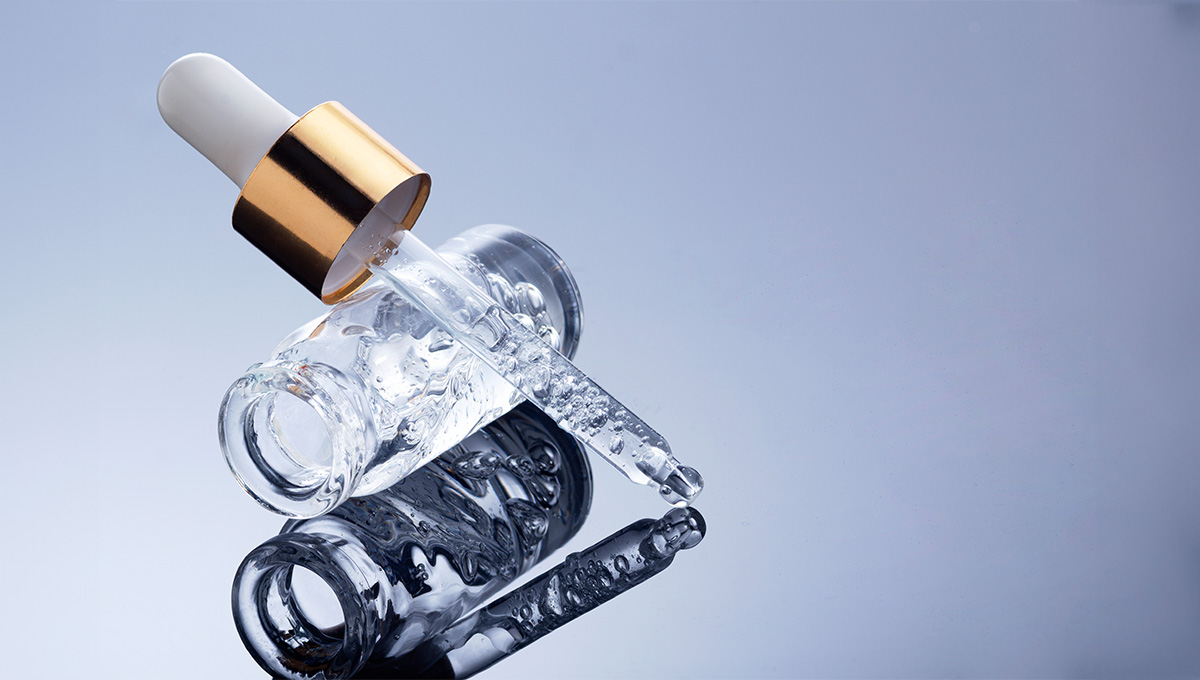 A naturally occurring glycosaminoglycan, hyaluronic acid (HA), is present in all the connective tissue in the body. Glycosaminoglycans are essentially polysaccharides, which are long, unbranched carbohydrates.
A naturally occurring glycosaminoglycan, hyaluronic acid (HA), is present in all the connective tissue in the body. Glycosaminoglycans are essentially polysaccharides, which are long, unbranched carbohydrates.
HA is the primary element that provides your skin structure and gives it a plump, moisturized appearance. The buzz about collagen may be familiar, but hyaluronic acid is the real deal.
Now that anti-aging is all the rage, it’s time to discuss hyaluronic acid, its advantages for the skin, and the significance of an ingredient’s molecular weight! It is essential to healing wounds and diminishes with age, leaving us more prone to wrinkles and drooping.
Continue reading to discover the science of hyaluronic acid. Why hyaluronic acid is used and is essential to any skin care regimen.
The Science Behind Hyaluronic Acid
Why is hyaluronic acid so popular is because it is present naturally in the skin. It is a water-binding molecule formerly referred to as a kind of glycosaminoglycan. It functions by drawing in a lot of water molecules and retaining them in the skin, which is necessary to keep the skin hydrated and plump.
Because our skin loses some of its hyaluronic acid as we age, it is a common element in many topical anti-aging therapies. Lab-made skin care products draw and retain water molecules on the skin's outer layer, similar to how our bodies naturally produce hyaluronic acid. This has the potential to replenish depleted fluids and, as a result, gently reduce wrinkles and fine lines.
Why Hyaluronic Acid is Everywhere
Are you wondering why, as we age, our skin becomes less hydrated, volumized, and plump? Your skin loses hyaluronic acid, collagen, and elastin over time. Because of its significant effect on the skin, hyaluronic acid in everything is a great remedy for any skin issues.
The following are the benefits of hyaluronic acid:
● Hydration: Water splatters cause the parched ground to absorb rainwater and keep the skin hydrated.
● Smoothness: Reduces wrinkles and lines and wrinkles by a significant amount, promoting soft, smooth skin.
● All Skin Types: Those with sensitive skin as well as skin types with open arms because of their soft nature.
● Healing Embrace: Wounds heal and damages repair, giving your skin a reassuring hug.
● Guardian Angel: It shields your skin from environmental toxins by utilizing its antioxidant capabilities.
● The Complexion Magician: It can help you achieve a flawless, bright complexion by balancing your skin tone.
● Firmness Secret: For a gorgeous appearance, tighten up and support the flexibility of your skin.
Types of Hyaluronic Acid Products
Hyaluronic acid in every beauty product comes in various forms, each with a distinct function.
● Serums: HA serums, which are highly hydrating and plumping, are designed to be lightweight and deeply penetrate the skin. They are available in varying concentrations to meet the needs and varieties of skin.
● Creams and Lotions: These mixtures of HA and other moisturizing substances provide the skin with nourishment and hydration.
● Fillers: To give volume to areas including lips, cheeks, and wrinkles, injectable HA fillers are utilized in cosmetic operations. These hyaluronic acid fillers usually offer longer-lasting effects because of their increased molecular weight.
● Facial Beauty Equipments: Certain equipment, including ultrasonic devices to improve HA absorption or microneedling devices with HA-infused serums, use HA in their treatments.
Molecular weight is a key factor in HA products’ effectiveness. Higher molecular weight HAs provide a barrier protecting the skin’s surface and retaining moisture. In contrast, small-molecule HAs can hydrate the skin from the inside out.
Benefits of Hyaluronic Acid
1.Hydration
Hyaluronic acid can be compared to a large glass of water for the condition of your skin. In water, it can withstand up to 1,000 times its molecular weight. By penetrating the skin and attaching water to skin cells, hyaluronic acid provides essential, restorative moisture to every layer of the skin.
2.Humectant
In skin care, humectants are heavily utilized. Comparable to a sponge, a humectant retains and draws in moisture even after it has been gathered. They draw water and permit hydrogen bonding.
Ingredients like glycerin, sorbitol (sugar alcohol), butylene and hexylene glycol, and hyaluronic acid are humectants used in skin care products, to heal dry skin.
3.Lipid Barrier
The epidermis, the top part of the skin, is most vulnerable to external harm (toxins). The lipid barrier in the epidermis, made up of fatty acids that hold water in place and keep irritants out of the skin, slows down with age.
UV radiation, pollution in the environment, and lifestyle decisions (such as smoking can incur damage). More wrinkles and lines, black spots, and drier skin are the outcomes of this damage.
Hyaluronic acid, which helps create an even more potent moisturizing effect, strengthens the skin’s natural defenses against moisture loss.
4.Amplified Resistance
The skin is more resilient to environmental aging causes and contaminants when hyaluronic acid serum strengthens and shields its lipid layer. The skin stays more radiant, youthful, and less wrinkly for a longer period when it is not combating these pollutants.
5.Helps Skin Firmness
Nobody ever wants sagging skin. The skin’s elastin degrades with age, causing the skin to lose its snap or bounce back.
Pinching the skin on the upper part of your hand is a simple way to measure your elastin or bounceback. If it returns soon, there’s still a lot of elastin in it.
While hyaluronic acid can help reduce the look of tight skin, it won’t replace your elastin.
6.Smoother Texture
Hyaluronic acid smoothes the skin’s texture like how it makes the skin appear tighter. You can witness and feel the smooth, velvety finish that comes from this.
7.Reduces Fine Lines and Wrinkles
It’s never too early to begin providing the skin with nourishment and protection. Indeed, hyaluronic acid is a component that helps skin between the ages of twenty and eighty. By keeping moisture in the face and diminishing fine lines and wrinkles, hyaluronic acid gives the appearance of plumped skin.
8.Promotes Regeneration of Cells
Hyaluronic acid helps encourage skin cell regeneration by providing the skin with additional hydration and barrier protection, even while it won’t hasten the cell renewal process. Naturally, this results in skin that is more vivid and cells that are healthier.
9.Reduces Pigmentation
Hyaluronic acid also aids in the prevention and reduction of pigmentation problems and aging spots. But it can’t accomplish it by itself. To address dark spots, one should combine hyaluronic acid with a vitamin C serum or booster product.
Are There Any Disadvantages in Using Hyaluronic Acid?
As long as you adhere to usage guidelines, use injection hyaluronic acid, topical treatments, and supplements seem safe overall.
Hyaluronic acid, however, may cause allergic reactions and unfavorable side effects. You should always perform a test patch when utilizing a new skincare product.
The following adverse effects are possible for those receiving hyaluronic acid injections; these should go away in a week:
● pain,
● swelling,
● redness,
● itching,
● bruises
It is more likely that the injection procedure will cause these negative effects than the hyaluronic acid liquid itself.
Conclusion
Hyaluronic acid naturally occurs in our body and lubricates joints and aids in preserving moisture in the skin and eyelids. Additionally, regulating inflammation and rerouting blood flow to injured tissue is essential for the healing of wounds.
As people age, our levels of hyaluronic acid decline. This could factor in age-related diseases like osteoarthritis and the visible symptoms of aging, including wrinkles. Hyaluronic acid is a common ingredient in medical and cosmetic products, but its effects can differ from person to person.
You can consult your doctor about hyaluronic acid-containing medical items or buy them from a drugstore.
FAQs
1.Do dermatologists recommend hyaluronic acid?
Yes, board-certified dermatologists advise hyaluronic acid. A naturally occurring chemical that aids in lubricating tissues and joints is hyaluronic acid.
2.Is there anything bad about hyaluronic acid?
When used orally: Hyaluronic acid is probably safe as long as it is utilized correctly. Although they are rare, allergic reactions can happen. When administered topically, Hyaluronic acid is probably safe in moderation.
3.What are the immediate effects of using hyaluronic acid on the skin?
Hydrating the skin makes it look plumper and lessens the visibility of wrinkles and fine lines.
4.Can hyaluronic acid products replace professional skincare treatments?
A common element in skin care products is hyaluronic acid. Skin care products commonly employ hyaluronic acid as a preventative strategy to reduce the appearance of fine lines and wrinkles and improve the texture and appearance of the skin. Hyaluronic acid products, however, cannot replace expert skincare procedures for wrinkle reduction.
5.How often should hyaluronic acid be applied for best results?
For optimal results, use a hyaluronic acid-containing moisturizer twice a day. Applying these items ought to come after cleansing your skin. Apply your moisturizer after exfoliating, and apply serums if these are part of your routine.


